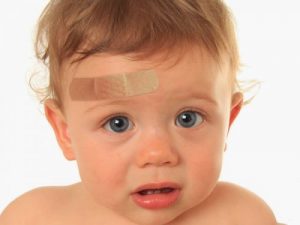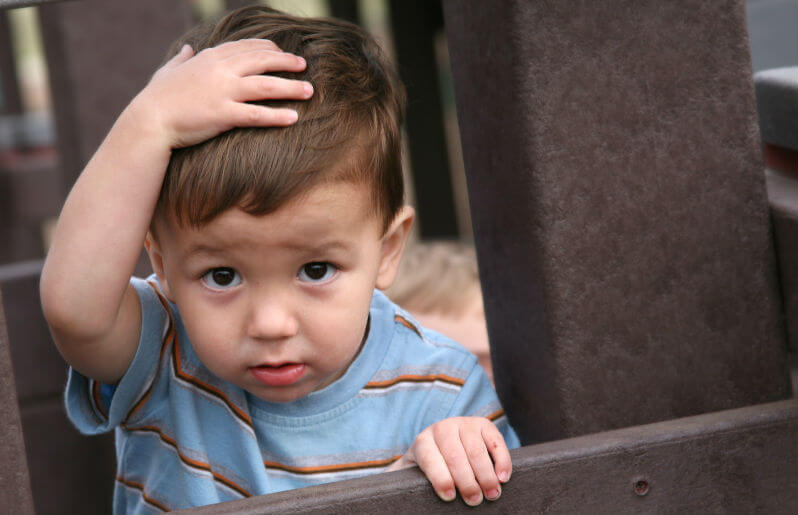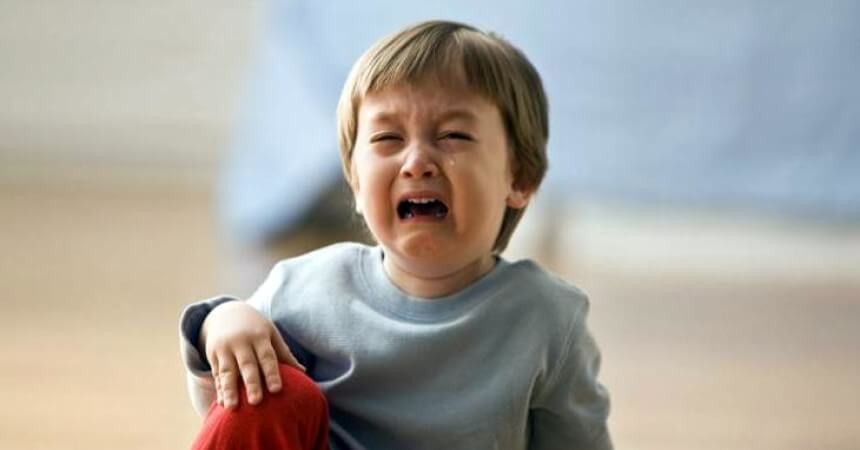What to Do if My Child Hits Their Head Hard?

Blows to the head are common during childhood; many of them, fortunately, are nothing more than a scare. When a child hits their head after falling, they may shed some tears and then after caresses, kisses and pampering, forget what happened to them.
“Children are the most important resource in the world and the best hope for the future.”
-John Fitzgerald Kennedy-
When children start walking on their own they tend to fall often. Their basic psychomotor skills are not yet developed enough to have effective mobility.
At this stage, blows to the head can also be more frequent, especially in those children who try to “run” before walking.
Children who hit their head when walking usually do not usually have serious consequences. These falls, as they are of low height, end in a bump and nothing else. Unfortunately, not all endings are always so happy, so if your child hits their head, take care of them and follow these recommendations.
What to do if your child hits their head

Mom, when your child hits their head, proceed as follows:
Observe their behavior for a few minutes
The first thing your child does after a hard or light blow to the head is what anyone does: cry.
In the midst of the crying, the family gathers to comfort the child and with your pampering and kissing, it is impossible to assess the situation. Therefore, when your child hits their head you should wait a few moments before taking them to the pediatric hospital.
You need to observe their reaction because it will be the symptoms after the fall that will tell you if it is only a blow without serious consequences or there is a possibility of a head injury.
If the child calms down with your touch and in the moment keeps playing and walking without any other reaction that indicates a brain injury, the fall is likely not dangerous. In this case, you should continue to watch for a few hours to be sure.
Be aware of any of these symptoms
Symptoms associated with traumatic brain injury after the child is hit hard in the head, and the symptoms for which you should run to the nearest hospital, are as follows:
- Loss or decrease of consciousness. In the latter case, even if your child is a little one-year-old, since you know them the best, you will be the first to notice if they are disoriented, confused, or if they are suffering a decrease of consciousness
- Excessive drowsiness
- Bump increasing in size.When you notice that the inflammation increases in size do not stay at home. Take your child to the emergency room
- Memory failure for events both before or after the fall. If you ask them to identify family members and they do not know you, this answer can be an indication of brain injury
- Loss of balance. If you are learning to walk this symptom can be difficult to see
- Vomiting
- Visual disturbances. This you can check by asking the child, once they calm down, if they see things normally
- Seizures
- A wound in the area of the blow
- Difficulties in speech. You know your child and you know their way of expressing themselves, their language usage and how they normally articulate. In case you notice any alteration in your communication you can take this symptom into account
- Motor dysfunction. This signal can be observed with the naked eye. You just have to watch them walk and coordinate their movements. They may also tell you if they feel weakness or numbness in any part of their body
- Headache
- Bleeding from the nose and ears.
Stay calm at all times

Mom, we know it’s hard to keep your cool when you notice any of the symptoms we mentioned earlier in your child; however, for your sake, you must be focused and know what to do at all times.
Although your first reaction after they hit their head is to encourage them, as at that time you do not know if it is a slight blow or an injury, it is advisable not to move or shake the child too much because that could hurt them.
If you focus on what just happened rather than becoming upset you will realize that you need to monitor your child for the next few hours and be alert.
Just by staying calm you can find a way to help them.
All cited sources were thoroughly reviewed by our team to ensure their quality, reliability, currency, and validity. The bibliography of this article was considered reliable and of academic or scientific accuracy.
- KidsHealth. (n.d.). Lesiones en la cabeza. KidsHealth. https://kidshealth.org/es/parents/head-injury-esp.html
This text is provided for informational purposes only and does not replace consultation with a professional. If in doubt, consult your specialist.
